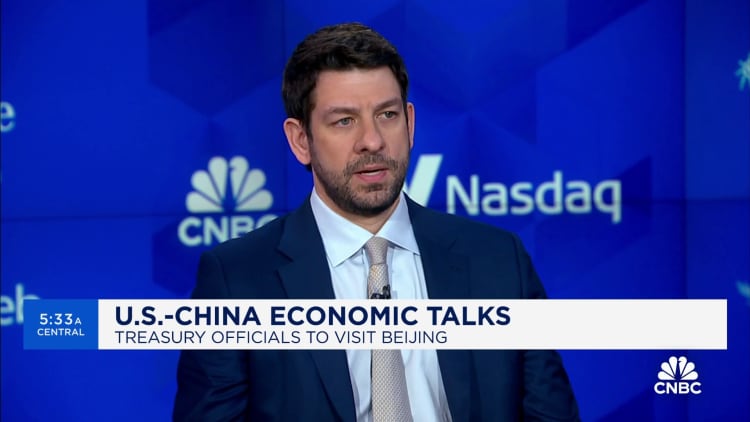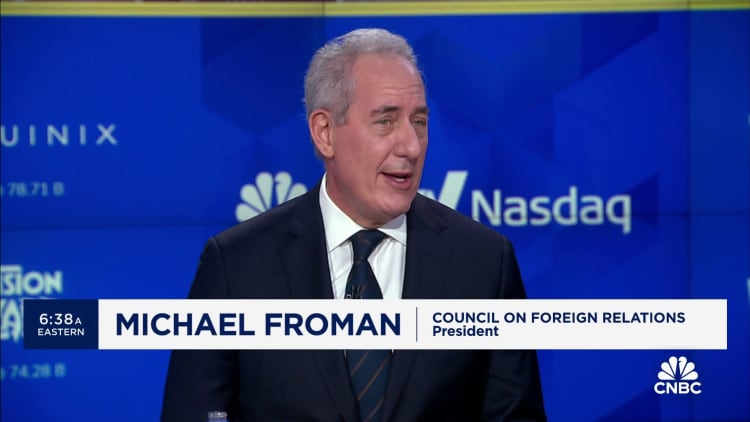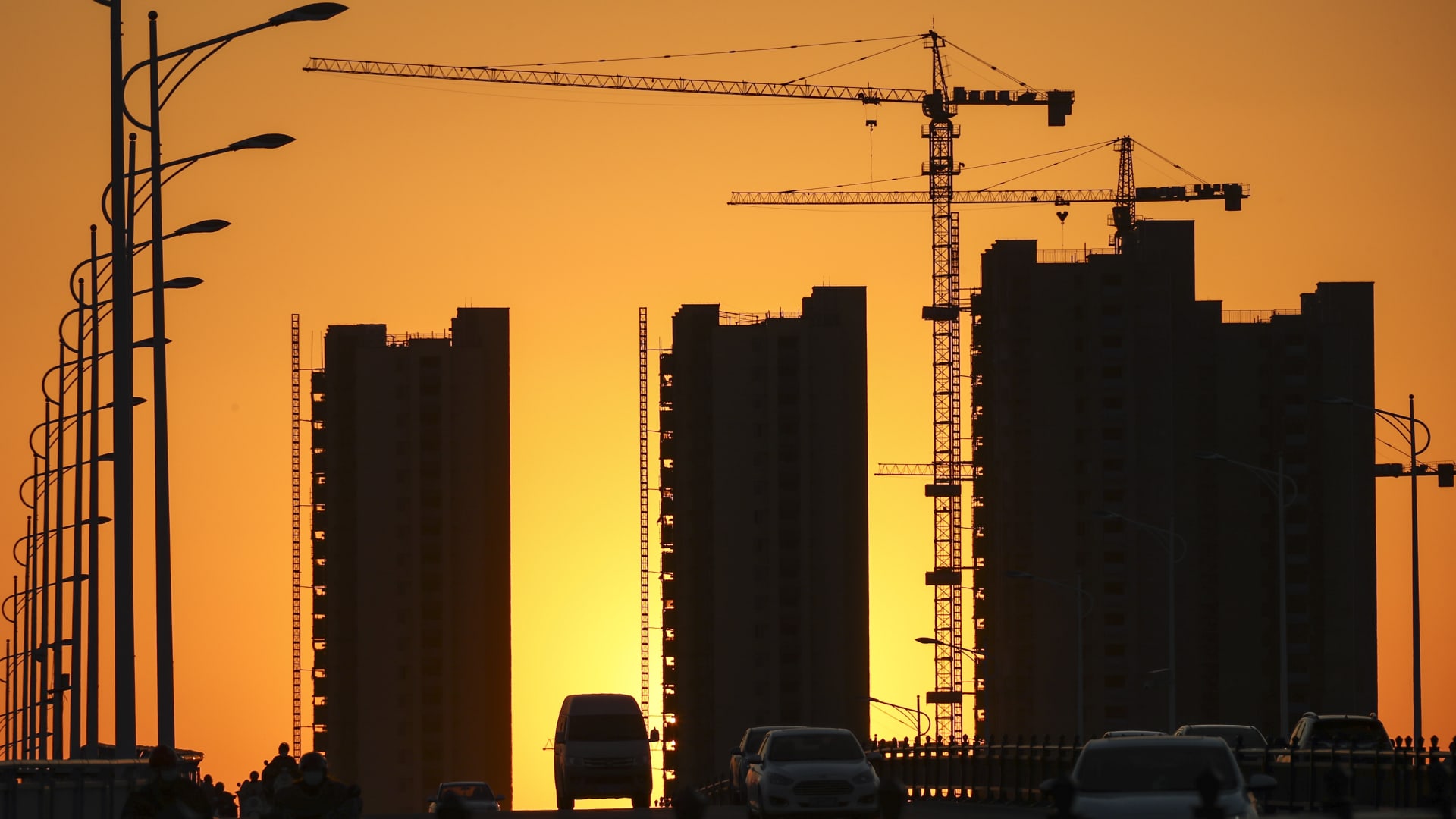Many Chinese developers have halted or delayed construction on presold homes due to cash flow problems. Pictured here is a property construction site in Jiangsu province, China, on Oct. 17, 2022.
Future Publishing | Future Publishing | Getty Images
China’s economy is sputtering.
Its property market is crumbling, deflationary pressures are spreading across the nation, and its stock market has weathered a turbulent ride so far this year, with the country’s CSI 300 index erasing some 40% of its value from its 2021 peaks.
Adding salt to the wound, January PMI numbers released by China’s National Bureau of Statistics showed manufacturing activity contracted for the fourth month in a row, driven by slumping demand.
The slew of downbeat data has consequently triggered a wave of skepticism toward the world’s second-largest economy. Allianz for one, reversed its buoyant view of China, now forecasting Beijing’s economy to grow by an average 3.9% between 2025 to 2029. That’s down from a 5% forecast before the Covid-19 pandemic broke out.
Ex-International Monetary Fund official Eswar Prasad also told Nikkei Asia that “the likelihood of the prediction that China’s GDP will one day overtake that of the U.S. is declining.”
Meanwhile, top economist and Allianz advisor Mohamed El-Erian highlighted China’s dismal stock market performance against those in the U.S. and Europe in a chart on X, saying it shows the stark divergence between all three equity markets.
China itself, however, isn’t willing to confess its economy is in tatters. Chinese leader Xi Jinping said on New Year’s Eve that the nation’s economy had grown “more resilient and dynamic this year.”
Feeding on such optimism, it’s fair to say there’s been some signs of hope for the beleaguered economy, but perhaps not enough to sway the bears. For instance, factory activity in China expanded for a third-straight month in January, while the nation’s luxury sector appears to be snapping back.
Such data has prompted bullish chatter among investors, suggesting consensus on China clearly lacks uniform.
Era of stagnation
Nobel laureate Paul Krugman has been among some of the most bearish voices toward China, saying the country is entering an era of stagnation and disappointment.
China was supposed to boom after it lifted its stringent “zero-Covid” measures, Krugman wrote in a recent New York Times op-ed. But it did the exact opposite.

From bad leadership to high youth unemployment, the country is facing headwinds from all corners, Krugman argued. And the country’s economic stumble isn’t isolated, Krugman warns, potentially becoming everyone’s problem.
Property crisis
China’s well-known property troubles have been the crux of Wall Street bearishness toward the Asian nation.
The International Monetary Fund said it expects housing demand to drop by 50% in China over the next decade.
Speaking at the World Economic Forum in Davos last month, IMF chief Kristalina Georgieva said China’s real estate sector needs “fixing,” while Beijing needs structural reforms to avoid a decline in growth rates.
Meanwhile, famed hedge fund manager and founder of Dallas-based Hayman Capital Kyle Bass said the country’s heavily indebted property market has triggered a wave of defaults among public developers. That’s a problem, given China’s real estate market can account for as much as a fifth of the nation’s GDP.
“This is just like the U.S. financial crisis on steroids,” Bass said, referring to China’s default-ridden property market.
“China is going to get much worse, no matter how much their regulators say, ‘we’re going to protect individuals from malicious short-selling,'” he added.
“The basic architecture of the Chinese economy is broken,” Bass continued.
Glimmers of hope
A gloomy picture for China, however, isn’t shared by all.
The Institute of International Finance said Beijing has the policy capacity to push China’s economy toward its growth potential and stuck to its above consensus forecast for 2024 growth at 5%, in a recent blog post. That view, however, depends on sufficient demand-side stimulus. The latest GDP numbers out of China for the last three months of 2023 missed analysts’ estimates, with a figure of 5.2%.

At the same time, Clocktower Group partner and chief strategist Marko Papic took an optimistic short-term view toward Chinese equities. In a Feb. 7 CNBC interview, Papic said he forecasts China stocks to jump at least 10% in the coming days as officials signal support efforts to bolster its flailing stock market.
A “10% to 15% rally in Chinese equities is likely in coming trading days,” Papic said.
JPMorgan Private Bank also outlined bull case scenarios for China in a recent post. “Despite the stock market’s slipping sentiment and persistent problems with the property market, certain segments of the Chinese economy have also proved their resilience,” it said.
The bank said China’s crucial role as a global manufacturer is unlikely to abate, adding that cyclical demand for its exports could remain intact.
Looking ahead, China has hurdles to overcome. Whether it has the firepower to do so, however, remains to be seen.
Image and article originally from www.cnbc.com. Read the original article here.

